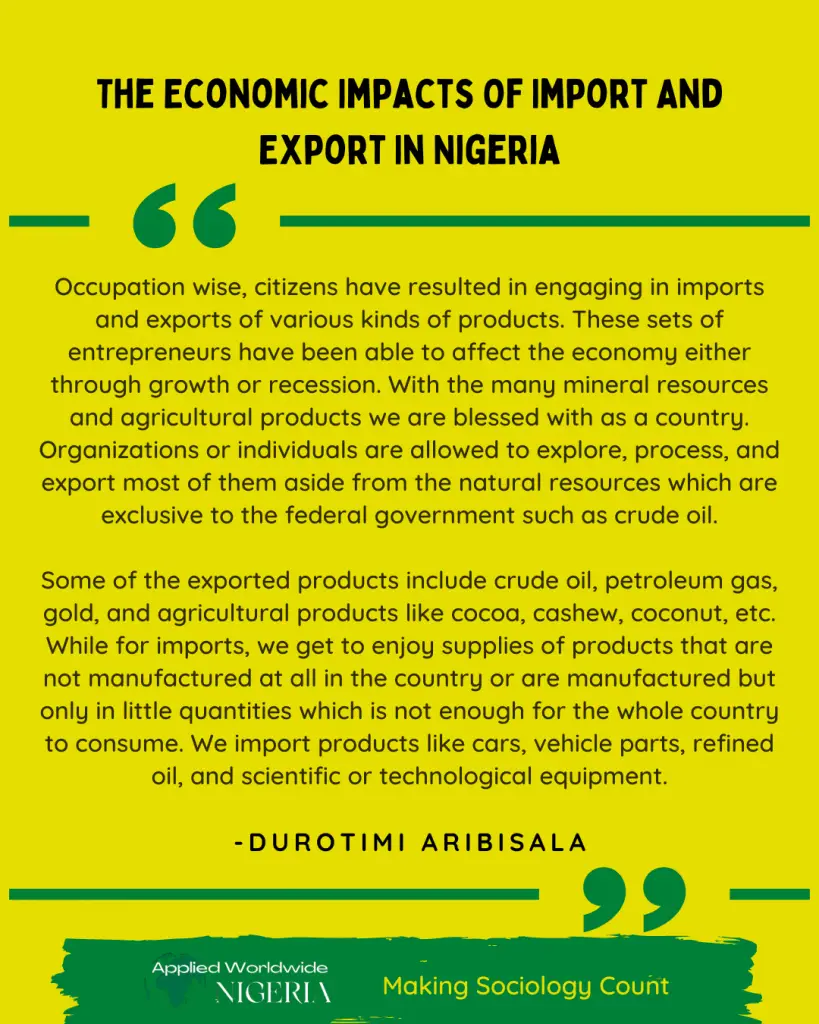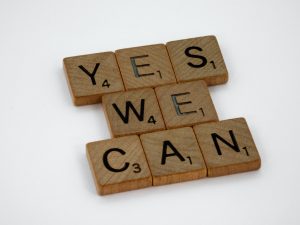Imports and export in Nigeria have always been a significant part of our economic activities, contributing to our GDP and determining if the economy grows or not. While we export a lot of products with crude oil being our major export product, we also import too many products which categorize us as a consumption country. We consume more than we produce and we import more than we export.

Occupational wise, citizens have resulted in engaging in imports and exports of various kinds of products. These sets of entrepreneurs have been able to affect the economy either through growth or recession. With the many mineral resources and agricultural products we are blessed with as a country. Organizations or individuals are allowed to explore, process, and export most of them aside from the natural resources which are exclusive to the federal government such as crude oil.
Some of the exported products include crude oil, petroleum gas, gold, and agricultural products like cocoa, cashew, coconut, etc. While for imports, we get to enjoy supplies of products that are not manufactured at all in the country or are manufactured but only in little quantities which is not enough for the whole country to consume. We import products like cars, vehicle parts, refined oil, and scientific or technological equipment.
Imports in Nigeria
Importing products into the country happens when such products aren’t manufactured locally, or we produce them but only in small quantities. In some cases, it is because the imported ones are cheaper than the locally made ones due to the high cost of production. Nigeria has been the destination of many internationally manufactured products. And such products are divided into these categories; mineral oils, organic chemicals, machinery, vehicles, iron and steel, electrical equipment, pharmaceuticals, cereals, dairies, aluminum, beverages, tobacco, etc.
Procedural Guide To Importing
- The first step to starting an importation business is registration of the company with the Corporate Affairs Commission (CAC) to get a certificate of incorporation/registration.
- Once the company has been registered with CAC, the next thing to do is to register with the Federal Inland Revenue Services (FIRS). To do that, the importer needs to provide up-to-date evidence of tax payment. Once verified, a Tax Identification Number (TIN) is issued along with a valid email address attached to it.
- Selection of a local bank to open a corporate bank account which is to act as the Authorized Dealer Bank (ADB) is next in line. The chosen bank as the ADB will carry out the duty of processing Form M and the Pre-Arrival Assessment Report (PAAR). This documentation is processed on the Nigeria Single Window Trade Portal. The chosen ADB is also charged with the responsibility of mediating with the necessary authorities on behalf of the importer.
- Following that, is obtaining a permit such as the Product Certificate from regulatory bodies concerned with the product the importer intends to bring into the country, especially for regulated products. These regulatory bodies are given the authority to stop or cease any kind of products imported which do not meet the necessary requirements as stated by the government.
- After that, the importer is expected to go on the Single Window Trade Portal to activate the Product Certificate (PC) which was issued by the regulatory body concerned with the product to be imported.
- The importer while still on the Single Window System opens a Form M to attach the necessary documents such as the Proforma Invoice, the Insurance Certificate, and also the Product Certificate then submits it to the Authorized Dealer Bank (ADB).
- When the ADB receives it, they review and validate it and then sends it to the Nigerian Customs Service (NCS).
- The NCS on receiving Form M either accept or reject it. Form M is rejected either when the form isn’t properly filled or when the required documents attached aren’t complete.
- If accepted, the importer will forward the Form M to the supplier of the product who will also forward the Form M alongside the Bill of Lading, the final invoice, and the packing list to Cotecna, an international accreditation form for the issuance of the SON Conformity Assessment Programme (SONCAP) Certificate.
- The importer then goes back to the Single Window Portal to activate the SONCAP Certificate to apply for PAAR issuance.
- Once the PAAR is issued, the importer can go ahead to start the clearance of the products.
- For shipping companies, the importer will submit the import manifest to the authorities such as the Nigerian Port Authority (NPA), the Nigerian Customs Service (NCS), and the terminal operators. Pay for ship charges, and pay NPA for the issuance of a bill of lading.
Exports In Nigeria
Nigeria without a doubt is one of the most blessed countries in the world with its long list of natural resources and minerals we have. Our dependence on oil has distracted us from every other resources forgetting that we can make more. Luckily, recent governments have been encouraging exports, especially of agricultural products and we’ve been able to export products like cassava, crude oil, cocoa, ginger, palm kernel, etc.
Procedural Guide To Exporting
- Compared to that of an importer, the procedures of exporting is shorter as the majority of the job is done by the agent also called a forwarder.
- The exporter is also required to register a company with the CAC to get the certificate of incorporation and also with the Nigerian Export Promotion Council (NEPC) to get the exporter’s certificate.
- After which he/she is required to get a local commercial bank to stand as the ADB and fill out the NXP form.
- The exporter gets the necessary permits from the necessary regulatory agencies. The necessary payments or royalties especially on regulated products such as solid minerals need to be paid.
- The exporter then makes the importer open a letter of credit.
- Get an insurance policy for cargo.
- Pays for transportation of the product to the port.
- After that, the exporter finds an agent or forwarder who takes up the responsibilities of arranging an inspection by the NCS or NDLEA, payment of excise duties, payment of terminal operators’ charges, booking space for a shipping agent, etc.
Summary
Until our natural resources and agricultural products are well explored, we will be able to export more as a country and increase our GDP. The federal government, corporate organizations, and individuals who see an opportunity in the import and export industry have been able to make millions in naira and in dollars and there are more opportunities in this industry which is capable of boosting the economy. More jobs and wealth can be created through this industry only when we can rightfully explore our resources.








